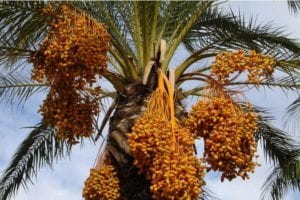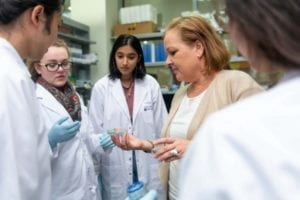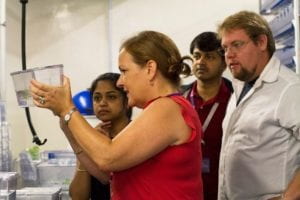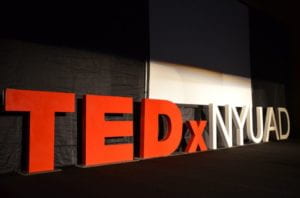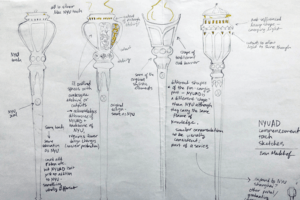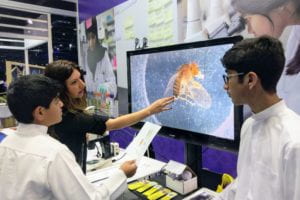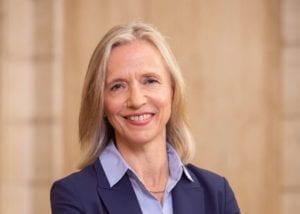 NYU President Andrew Hamilton today announced the appointment of Mariet Westermann — Executive Vice President of The Andrew W. Mellon Foundation, former provost of NYU Abu Dhabi, former director of NYU’s Institute of Fine Arts, and art historian — as the Vice Chancellor of NYU Abu Dhabi, effective August 1, 2019.
NYU President Andrew Hamilton today announced the appointment of Mariet Westermann — Executive Vice President of The Andrew W. Mellon Foundation, former provost of NYU Abu Dhabi, former director of NYU’s Institute of Fine Arts, and art historian — as the Vice Chancellor of NYU Abu Dhabi, effective August 1, 2019.
Her selection follows a 10-month long, international search that considered many outstanding candidates from around the world. According to President Hamilton, “We are thrilled by the appointment of Mariet Westermann. The creation of NYU Abu Dhabi was an innovative move, one that has helped make NYU pre-eminent in global education. And thanks to our shared vision with our partners, NYU Abu Dhabi has been a tremendous success: with distinguished faculty, top students from around the world from all backgrounds, and excellent leadership, it has become a regional leader in research, and its graduates have gone on to prestigious international honors, top graduate and professional programs, and leading employers and positions. Therefore, in choosing a new Vice Chancellor, we sought someone who would not only be a leader capable of taking NYU Abu Dhabi into its next stage, but who would also contribute to NYU’s leadership globally and be a real presence in the cultural and intellectual life of Abu Dhabi.”
“With her proven leadership qualities, her experience and involvement in the founding of NYUAD, her superb academic qualifications, her skill as an institution-builder, in Mariet Westermann we found just such a person,” said President Hamilton.
Dr. Westermann, the Vice Chancellor-designate of NYU Abu Dhabi, said, “It is a great honor and calling to serve as NYU Abu Dhabi’s Vice Chancellor. In a brief nine years, NYU Abu Dhabi has become a unique, flourishing institution of higher education: in and of New York University, in and of Abu Dhabi, in and of the world, with a truly diverse and engaged student community, an outstanding and dedicated faculty, an innovative undergraduate curriculum, and an ambitious research agenda. At a time when international engagement is vital to the future of our planet, NYU Abu Dhabi is a beacon situated in a dynamic city and a historic crossroads.”
In addition to being named to the Vice Chancellorship, she will be appointed a Professor of Arts and Humanities at NYU Abu Dhabi.
Westermann has been at the Mellon Foundation since 2010, and has been the executive vice president for programs and research since 2016. In that role, she has launched initiatives that study and promote the value of the humanities and the liberal arts, strengthen community colleges, encourage graduate education reform, renew preservation of cultural heritage around the world, and support scholars and artists at risk. At Mellon, she has also led pathbreaking work on diversity and inclusion in American museums, and written extensively about the liberal arts, the humanities, and higher education. Prior to the foundation, she was on the faculty at NYU, first as director of the Institute of Fine Arts and then as the first provost of NYU Abu Dhabi, where she hired the startup team and initial faculty, helped shape the curriculum and launch the NYU Abu Dhabi Institute, and developed warm relationships with the Abu Dhabi community, among other important undertakings. Before coming to NYU in 2002, she was associate director of the Clark Art Institute. From 1995 to 2001, she was an assistant and associate professor of art history at Rutgers.
She received her undergraduate degree, magna cum laude, from Williams College, where she was elected to Phi Beta Kappa. She received her Masters and her PhD from NYU’s Institute of Fine Arts.
Westermann’s principal area of scholarly interest is the art of the Netherlands, her native country. She is widely published in the field, including A Worldly Art: The Dutch Republic 1585–1718 (1996); The Amusements of Jan Steen: Comic Painting in the 17th Century (1997); Rembrandt – Art and Ideas (2000); and numerous articles. She has edited five books, including Anthropologies of Art (2005). Her extensive work with museums includes her Rijksmuseum Dossier: Johannes Vermeer (2004); the curatorship of Art and Home: Dutch Interiors in the Age of Rembrandt (Denver Art Museum and Newark Museum, 2001); and numerous exhibition catalog essays. She is currently preparing an exhibition and book on the resonance of the Garden of Eden in the history, theology, and art of Judaism, Christianity, and Islam, with significant implications for garden practice in these cultures. She has been the recipient of fellowships, honors, and grants from a wide range of organizations, including the National Endowment for the Humanities, American Philosophical Society, Center for Advanced Study in the Visual Arts, Clark Art Institute, College Art Association, and Metropolitan Museum of Art.
President Hamilton said, “Along with the announcement of this good news about Mariet, two expressions of gratitude in order. First, I am grateful to Dick Foley and Una Chaudhuri, the co-chairs of the Search Committee, and all the other members of the Committee. Their thoughtfulness, discernment, and perseverance have resulted in a wonderful person to lead NYU Abu Dhabi during the next stage of its development. The Committee members took on this important task in addition to their existing responsibilities, and I thank them.
“I would also like to take this occasion to extend NYU’s profound gratitude to Al Bloom, NYU Abu Dhabi’s inaugural vice chancellor. Turning a groundbreaking idea into a reality is one of the most exciting things one can do in one’s career, and one of the most difficult, perhaps particularly so in the field of higher education, where reputation matters so greatly and usually requires such a long time to build. Al made sure that NYU Abu Dhabi succeeded on every measure. Over time, the establishment of NYU Abu Dhabi will, without doubt, turn out to be one of the great success stories of higher education. Al should be very proud of what he’s accomplished; we are surely proud of him.”
NYU Abu Dhabi represents a transformative shift in higher education, one in which the intellectual and creative endeavors of academia are shaped and examined through an international and multicultural perspective. Admissions selectivity and yield among students from over 120 countries equals or exceeds that of the most rigorous global institutions. And in under ten years, NYU Abu Dhabi has produced 12 Rhodes Scholars — the highest number of Rhodes Scholars per student of any university in the world – in addition to five Schwarzman Scholars and numerous other prestigious academic awards, including Truman and Luce Scholarships and Fulbright Awards.
This post comes to us from NYU Abu Dhabi. You can find the original here.
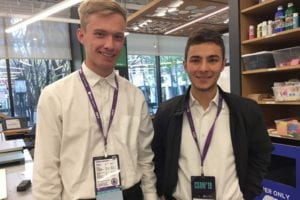 Two NYU Abu Dhabi (NYUAD) students have won first place in the Hack3D competition as part of CSAW, the world’s most comprehensive student-led cybersecurity competition.
Two NYU Abu Dhabi (NYUAD) students have won first place in the Hack3D competition as part of CSAW, the world’s most comprehensive student-led cybersecurity competition.